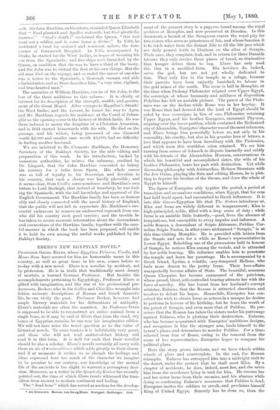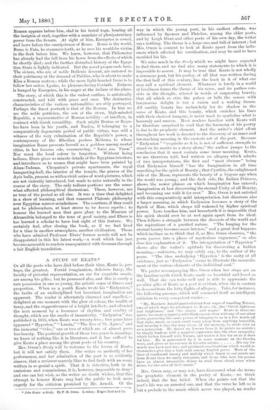EBERS'S NEW EGYPTIAN NOVEL.*
PROFESSOR GEORG EBERS, whose Egyptian Princess, Uarda, and Homo S16711. have secured for him an honourable name in this country, as well as great fame in his own, comes before us to-day with a new novel. Ebers is a novelist by accident, not by profession. He is in truth that traditionally most dreary of mortals, a learned German Professor. But besides the accomplishments pertaining to Egyptology, Professor Ebers is gifted with imagination, and like one of his professional pre- d.ecessors, Becker, who in his Gallus and Charikles wrought into fiction accurate descriptions of Roman and Greek domestic life, he can vivify the past. Professor Becker, however, had ample literary materials for his delineations of antiquity. Ebers's materials are often the scantiest. As Professor Owen is supposed to be able to reconstruct an entire animal from a single bone, so it may be said of Ebers that from the dead, dry bones of Egyptian remaius he can rear his imaginative edifice. We will not here raise the vexed question as to the value of historical novels. To some readers it is indubitably very great, and those who will not read matter-of-fact history will read it in this form. It is well for such that their novelist should be also a scholar. Ebers's novels certainly all carry with them an air of vraisemb/ance which adds greatly to their charm and if at moments it strikes us as though the feelings and ideas expressed bore too much of the character we imagine to be peculiar to our century, our knowledge of the mental life of the ancients is too slight to warrant a peremptory deci- sion. Moreover, as a writer in the Quarterly Review has recently pointed out, the time of which Ebers treats witnessed the tran- sition from ancient to modern sentiment and feeling. The "dead bone" which has served as nucleus for the develop.
• Die &Maniere. Roman, von Georg Ebers. Stuttgart Rallberger. 1880.
ment of the present story is a papyrus found among the royal archives of Memphis, and now preserved at Dresden. In this document, a hermit of the Serapeum craves the royal pity for two sisters who serve as priestesses of Isis, and whose function it is to fetch water from the distant Nile to fill the 360 jars which
are daily poured forth in libations on the altar of Serapis. Their cans, they complain, leak, and in return for these Danahle labours they only receive three pieces of bread, so diminutive-
that hunger drives them to beg. Ebers has only used this idea in a modified form. His heroines do, indeed, serve the god, but are not yet wholly dedicated to him. They only live in the temple as a refuge, because their parents have been unjustly banished, to labour in the gold mines of the south. The scene is laid in Memphis, at the time when Ptolemy Philometer reigned over Upper Egypt, the sovereign of whose humanity .and mildness of disposition Polybius has left an amiable picture. The power of the Ptole- mies was on the decline while Rome was in her heyday. It was Rome that had decreed that the land of Egypt should be ruled by two sovereigns in lieu of one, Philometer retaining Upper Egypt, and his brother Euergetes, surnamed Physcon, reigning over the lower portion, which contained the Hellenised.
city of Alexandria. Euergetes' character was of the most infamous, and Ebers brings him powerfully before us, not only in his sensuality, his cruelty, but also in his genuine love of letters, a love that appears to have been hereditary with the Ptolemies, and which even this worthless scion retained. We see him turning from scenes of debauch to dispute learnedly and subtly with his friends of the Alexandrian Museum, conversations in which his beautiful and accomplished sister, the wife of his brother Philometer, bears her part with distinction. Yet while discussing philosophy with Aristarchus, Hebrew literature with the Jew Onias, playing the flute and editing Homer, he is plot- ting to deprive his brother of the throne, and draw the whole of Egypt to himself.
The figure of Euergetes ably typifies the period, a period of transition and anomalous conditions, when Egypt, that for eras had held itself apart, had succumbed to Greek influences. It is into this Grteco-Egyptian life that The Sisters introduces us. Klea and Irene are widely different in temperament ; Klea is high-principled, noble, filled with a deep sense of duty ; while Irene is an amiable little butterfly,—good, from the absence of temptations, but susceptible to every impulse and influence. A noble Roman, a descendant of Scipio Africanus, Publius Cor- nelius Scipio Nasica, in after-years nicknamed "Serapis," is at this time visiting Memphis. He is provided with letters from the Senate and acts for a while as Rome's representative in Lower Egypt. Beholding one of the processions held in honour of Serapis, he notices Klea among the vestals, and is attracted by her noble bearing. His influence enables him to penetrate the temple and learn her parentage. He is accompanied by a Greek friend, Lysias, a volatile, t asy-tempered Hellene, who feels more drawn to the pretty Irene. Their love-affairs unexpectedly become affairs of State. The beautiful, sensuous Queen Cleopatra has become enamoured of the patrician, whose proud, blunt, self-controlled bearing attracts her with the force of novelty. She has learnt from her husband's corrupt minister. Eulaeus, that the Roman is attracted elsewhere, and resolves to defeat his hopes. Meanwhile, Euergetes has con- ceived the wish to obtain Irene as actress in a masque he desires to perform in honour of his birthday, but he fears the wrath of the priest of Serapis, and even more that of Publius. He per- ceives that the Roman has taken the sisters under his patronage against Eulaeus, who is plotting their destruction. Eulaeus, who has become acquainted with Euergetes' ambitious designs, and recognises in him the stronger arm, lends himself to the tyrant's plans, and determines to murder Publius. For a time: relieved from fear of Rome, owing to the removal from the scene of her representative, Euergetes hopes to compass his political plans.
Here the story grows intricate, and we have wheels within wheels of plots and counterplots. In the end, the Roman triumphs. Eulaeus has entrapped him into a midnight visit to the desert, under the pretext that he shall meet Klea. By a chapter of accidents, he does, indeed, meet her, and she saves . him from the murderers lying in wait for him. He rescues her and her sister Irene from their enemies, and his absence while doing so confirming Eulaeus's assurance that Publius is dead, Euergetes incites the soldiers to revolt, and proclaims himself King of United Egypt. Scarcely has he done so, than the Roman appears before him, clad in his festal toga, bearing all the insignia-of rank, together with a mandate of plenipotentiary power from the Senate. At sight of him, Energetes is cowed, and bows before the omnipotence of Rome. Rome is the world, Rome is Fate, he stammers forth, as he sees his would-be victim
in the flesh before him. We learn, however, that Philometer has already had the fall from his horse from the effects of which be shortly died ; and the further disturbed history of the Egyp- tian State is lightly indicated. But the novel proper ends here. The sisters, who are of noble Hellenic descent, are restored to -their patrimony at the demand of Publius, who is about to make Klea a Roman matron ; while the more light-hearted Irene is to follow her suitor, Lysias, to pleasure-loving Corinth. Eulaeus is hanged by Euergetes, in his anger at the failure of his plans.
The story, of which this is the rudest outline, is artistically constructed, and told with grace and ease. The distinctive characteristics of the various nationalities are ably portrayed. Perhaps the finest portrait is that of the Romau. In him we see the noble patrician, the son of the stern, high-minded Republic, a representative of Roman nobility—of intellect, in contrast with Greek versatility. Such might Brutus or Regu- lus have been in his youth, and Nasica, if belonging to a comparatively degenerate period of public virtue, was still a witness of the very culmination of the Republic's power, a contemporary of the Rhoclian poetess Meliuno, to whose imagination Rome presents herself as a goddess among mortal -cities, in her famous ode, commencing, " Xecipi pot, Nor must the local colour be forgotten. Without being tedious, Ebers gives us minute details of the Egyptian interiors, and. introduces us to scenes that might have been painted by Alma-Tadema. Cleopatra's private apartments, the royal banqueting-hall, the interior of the temple, the graves of the Apia bulls, present us with a vivid series of word-pictures, which are not violently introduced, but made to arise naturally in the coarse of the story. The only tedious portions are the some- what affected philosophical discussions. These, however, are as true of the period. as all else. It was a time that delighted in a show of learning, and that veneered Platonic philosophy -over Egyptian narrow-mindedness. The courtiers, if they could not be philosophers, at least strove to be beaux esprits ; to honour the learned men that gave glory to the Museum of Alexandria belonged to the tone of good society, and Ebers is too learned a scholar to have lost sight of this feature. We certainly feel, after closing the book, as if we had. lived for a time in another atmosphere, another civilisation. Those who have admired. Professor Ebers' former novels will not be disappointed in this his latest work,—a work which has just. become accessible to readers unacquainted with German through a fair English translation.



































 Previous page
Previous page